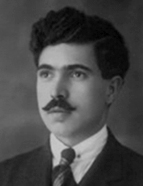

He broke off his studies and researches in 1917, when he was recruited to participate as militia officer in the Portuguese Expeditionary Corps which was sent to Flanders, where he braved the fateful battle at La Lys. But surviving the war, and needing to look for steady employment, Estanco Louro entered the Escola Normal Superior to train as a teacher. In August 1919 he was appointed as an associate teacher in the Liceu Pedro Nunes (Lisbon). For the State Examination he presented a dissertation called Do ensino da língua francesa em Portugal, especialmente na instrução secundária [On the teaching of the French language in Portugal, with special reference to secondary education], in which he defended the application of the “direct method” in teaching languages, which he located within the thinking of “positive humanism”.
Estanco Louro belonged to a generation of teachers who, in the first decades of the twentieth century, were trying to reshape teaching methods in Portugal, promoting a scientifically based pedagogy and a didactic approach that could apply it with success. He published various books on grammar, including a comparative study of the first Portuguese grammars from the sixteenth century, and also a comparative study of literature from the same period. The researches that he made for these publications on the historical evolution of the Portuguese language, dealing with different aspects of phonetics, syntax and the formation of vocabulary, along with his comparative studies of Latin cultures and languages, would be fundamental to the paradigm shift in his later work, by which he distanced himself from some of the canonical norms of the world of letters. Against the historical and evolutionary approach to linguistics, with its rigorous inventory of phonetics, he would counterpose an ethnic and geographic approach, which he considered more dynamic, along with an application of linguistic geography. To the ethnographic vision of collecting legends and other aspects of folklore, which still dominated ethnographic studies, he would apply an analysis of the norms of social and economic organization, conditioned by geography, natural environment, and local history.
In this same period of intense activity in research and publication, between 1919 and 1929, he also gained his academic degrees: a degree in law, in 1922 (he would briefly practise law in Beja, between 1922 and 1923), and a diploma in Camonian Studies, in 1927. The latter was distinguished by his dissertation and public lecture on the theme of Os Lusíadas e o povo português: no vocabulário, in which he presented a first lexicographic classification, and emphasized the importance of popular speech in this work by Camões. He shared and debated his researches and ideas with other intellectuals, in particular with Leite de Vasconcelos, since the passionate interest they shared on dialect and ethnography brought a closer relationship between the one-time teacher and pupil, and also with Dr José Maria Rodrigues, whom he respected as a professor, and with Fidelino de Figueiredo, amongst others.
